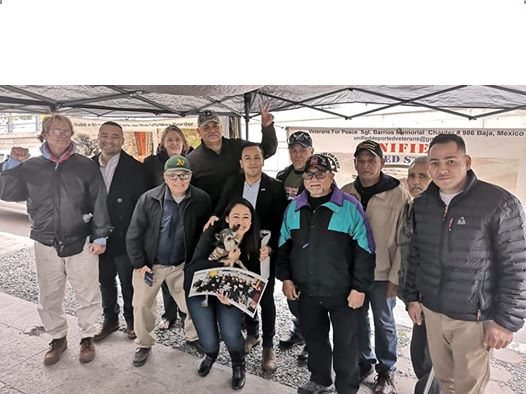When I found out the U.S. government was deporting our veterans who had served in the U.S. Armed Forces, risking their lives for our freedoms, I was incensed. How could we be throwing away those who have sacrificed for this country? And why hadn’t these immigrants who have long been known to incredibly contribute to our military’s successes become citizens?
Diversity Is Capacity As a retired Air Force Lieutenant Colonel, I had seen firsthand how service members from other countries offered valuable insight and experience to efforts essential to accomplishing the mission. And familiarity with cultures outside of traditional Americans only enhanced the average troop’s understanding and expertise required for success internationally.
The View On The Ground Consequently, I spent time in Mexico (where the largest population of deported veterans live) to see how I could help them repatriate to the country they consider their home, the USA. I celebrated holidays with them, met their families, listened to their stories, and even went to a U.S. detention center with the parents of a combat veteran who was fighting deportation. (He lost his case and was deported to Central America where he hadn’t live since he was 3 years old.) What I learned changed me forever. (See A Christmas In Mexico With Our U.S. Deported Veterans.)
How It Goes The stories of these deported veterans are many and varied but mostly heart wrenching. Typically, they were legally living and working in the U.S. when deportation ripped their lives apart. It impacted their jobs, families, financial and mental stability, and their dreams. The current pandemic has given many of us tremendous insight into what it means to be separated from our families. It still doesn’t touch the experiences of some of these vets who were deported to countries they often barely know.
Double Jeopardy All of these veterans ran afoul of the law in some way, from minor to serious offenses like possessing marijuana to assault in a bar fight. Some crimes considered felonies when they were deported have since become misdemeanors for which they would not be deported today. When American citizens commit crimes, they are required to pay for them. When immigrant veterans do the same, they must pay their dues to society as well AND be deported. It’s a double devastating hit to their lives – cruel, but unfortunately, not unusual for these veterans.
Mental Health, Incompetence, Promises Broken Many of their crimes can be traced back to untreated PTSD they developed while in the service. Some are altogether innocent but pleaded guilty on the advice of incompetent lawyers to speed up the legal process – only to discover too late that they would then be deported. Many of them had no idea they weren’t already considered U.S. citizens because an expedited path to citizenship had been promised to them upon their recruitment to the service.
Health Care These veterans aren’t even able to get VA health care for their service-connected disabilities. While they are eligible for this care, since they are not permitted to enter the U.S., they cannot go to a VA hospital to obtain it. They are entitled to compensation for their injuries, but they must find what they need where they are, and often the expertise does not exist locally.
Dying To Get Home Except for a handful who have been granted pardons or managed some legal or political maneuvering, their only hope of returning to the U.S. is in a body bag. Those who were honorably discharged are allowed to be buried in a national cemetery with full honors including an American flag given to their next of kin.
Candidate Promises President Biden has made immigration and military issues a top priority, but he has yet to specifically address the repatriation of deported veterans. At a November 2019 CNN Town Hall, then-presidential candidate Biden was asked how he planned to help veterans who were deported to their native countries. He responded, “Bring them back.”
What Needs To Happen On his first day in office, Senator Tammy Duckworth wrote a comprehensive letter to President Biden outlining the issues immigrant service members and veterans face along with what needs to be done to correct these travesties. The recent shift in political winds has given these veterans hope like they haven’t felt in years, and for some, decades. But will these promises be kept?
The Right Thing To Do I hang out with deported Mexican felons (and those from other countries on various Zoom calls) because ANY veteran who has been willing to risk his or her life for our freedoms deserves to be able to obtain citizenship and remain in the country he or she was willing to defend.
Military Family These deported veterans are my fellow veterans – members of my military family. They treat me with the utmost respect, often let me know how much they appreciate my advocacy for them, and look out for me like bodyguards to keep me safe. I have been welcomed into their world, and they have become my friends.
My Fellow Americans They tell me fascinating stories, often about how they ended up where they are, what they endured along the way, and what lessons they’ve learned. Despite all of their disappointments, most of the time, they somehow manage to find joy in life. One day soon, I hope to be able to call them “my fellow Americans.”


